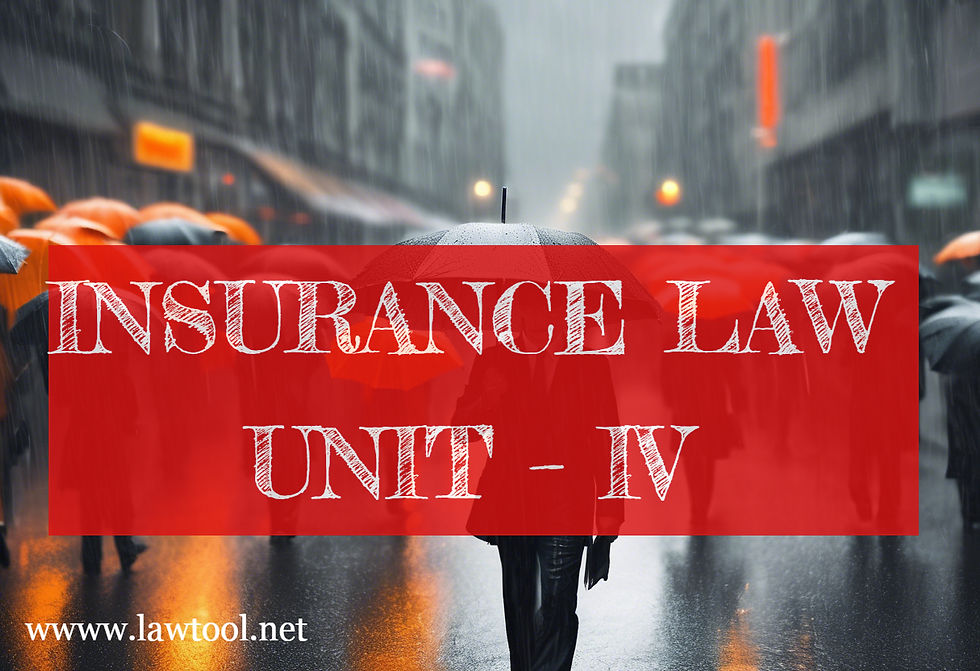INSURANCE LAW UNIT – V
- www.lawtool.net

- Sep 1
- 7 min read
Marine insurance isn't just another type of insurance; it is a crucial safeguard for businesses that depend on maritime transport. As global trade surges—with a reported $18 trillion in goods being shipped annually—the importance of understanding marine insurance can't be overstated. This article explores the nature and scope of marine insurance, its classifications, insurable interest and values, key provisions of marine policies, and legislation relevant to this field, particularly the Marine Insurance Act of 1963.
Nature and Scope of Marine Insurance
Nature and Scope of Marine Insurance
It is a contract where the insurer undertakes to indemnify the insured against marine losses (i.e., losses related to maritime adventure).
Covers ships, cargo, freight, and other interests.
Scope includes:
Ship hull insurance (protection for the ship)
Cargo insurance (goods in transit)
Freight insurance (loss of freight revenue)
Liability insurance (legal liabilities to third parties)
Marine insurance protects those involved in maritime activities, which include shipping companies, cargo owners, and insurers. It covers various risks, including damage to ships, loss of cargo, and issues related to freight during shipping.
The principles of indemnity and insurable interest are central to marine insurance. Indemnity ensures that the insured is compensated for losses, allowing them to return to their financial position before the incident. Insurable interest means that the insured party stands to suffer a financial loss if the object of insurance is damaged. For example, a shipping company will have an insurable interest in a vessel it owns, and a retailer will have an insurable interest in goods they have shipped but not yet sold.
Together, these principles ensure that marine insurance serves its purpose of mitigating financial risks associated with maritime transport, such as:
Environmental factors like storms or shipping lanes affected by ice.
Operational mishaps including equipment failure during transit.
Navigational hazards like underwater rocks that can damage vessels.
Classification of Marine Policies
Classification of Marine Policies
Voyage Policy – Covers risks during a specific voyage.
Time Policy – Covers risks for a specified period, e.g., 6 months, 1 year.
Mixed Policy – Combination of voyage and time.
Valued Policy – Value of the subject-matter insured is agreed beforehand.
Unvalued Policy – Value is determined after the loss.
Floating Policy – Covers shipments without naming specific ships or voyages.
Wagering Policy – No insurable interest; not enforceable under law.
Type (प्रकार) | Meaning (अर्थ) |
Voyage Policy (यात्रा बीमा) | Covers a specific voyage. (विशिष्ट यात्रा को कवर करता है।) |
Time Policy (समय बीमा) | Covers for a fixed time period. (निर्धारित समय के लिए कवर करता है।) |
Mixed Policy (मिश्रित बीमा) | Combination of voyage and time. (यात्रा और समय का संयोजन।) |
Valued Policy (मूल्यांकित बीमा) | Pre-agreed value insured. (पूर्व सहमति मूल्य बीमा।) |
Unvalued Policy (अमूल्य बीमा) | Value decided after loss. (हानि के बाद मूल्य तय होता है।) |
Floating Policy (फ्लोटिंग बीमा) | Covers multiple shipments. (कई शिपमेंट्स को कवर करता है।) |
Wagering Policy (सट्टा बीमा) | No insurable interest — unenforceable. (कोई बीमित हित नहीं — अमान्य।) |
Marine insurance policies are diverse and can be classified based on coverage type, geography, and the insured interest. The most common types include:
Hull Insurance: Protects against damage to the actual vessel. For instance, if a cruise ship collides with a cargo freighter, hull insurance would cover repair costs, which can reach millions of dollars.
Cargo Insurance: Ensures that goods transported by sea are protected. For example, businesses often obtain cargo insurance to shield against losses from theft or damage during transit. According to statistics, around 70% of all goods transported globally are done by sea, highlighting the importance of this insurance.
Freight Insurance: Covers the costs incurred for transporting goods. If cargo gets stolen or damaged, freight insurance secures the shipping costs, preventing potential total loss for companies.
Liability Insurance: Protects against legal claims arising from maritime operations. If an accident results in prompt medical costs for injured crew members, liability insurance helps cover those expenses, which can be significant.
These classifications support businesses in minimizing risks from unpredictable and often hazardous marine conditions.
Insurable Interest
Insurable Interest
Meaning:A person must have a legal relationship to the subject matter insured and would suffer a loss if the subject is damaged.
Examples:Shipowner, cargo owner, consignee, mortgagee.
Insurable interest is a critical element in marine insurance. To have a valid insurance policy, parties must have a financial stake in the insured item. Without it, policies become void. The following entities often have insurable interests:
Shipowners: They hold insurable interest in their vessels and operations.
Cargo Owners: As soon as a shipment is in transit, cargo owners have an insurable interest. For instance, a tech company shipping smartphones will want to ensure coverage until the delivery is confirmed.
Freight Forwarders: Those who arrange transport for goods also have a vested interest, especially regarding freight costs involved.
Recognizing insurable interest helps ensure that businesses are covered effectively and legally.
Insurable Values
Understanding insurable value—the monetary worth of the interest being insured—is crucial for determining the appropriate insurance coverage. Here are the key assessment methods:
Actual Cash Value: This is the replacement cost after accounting for depreciation. For example, if a vessel's current market value is estimated at $1 million, this value helps determine the insurance premium and payout in the event of a loss.
Agreed Value: A sum mutually agreed upon by both the insurer and the insured, often used for unique items. If a historical ship worth $3 million is insured for that exact amount, the coverage is straightforward.
Market Value: This reflects the current selling price of a vessel or cargo. If a cargo of luxury goods has a market sell value of $500,000, that will guide the insurance coverage decisions.
Determining the insurable value accurately is critical to avoid being underinsured or overinsured, which can lead to financial losses or unnecessary premiums.
Understanding Marine Insurance Policies
A marine insurance policy is a contract that articulates the terms and coverage provided by the insurer. It's vital to consider these core elements:
Conditions and Express Warranties
Understanding the conditions and express warranties within the policy is essential.
Conditions: These stipulations must be met for the policy to remain valid. For instance, a ship may need regular inspections to comply with insurance standards.
Express Warranties: These guarantees may concern the operation or condition of the vessel. If a shipping company promises to adhere to specific safety protocols and fails to do so, they may risk losing coverage.
Being aware of these conditions aids businesses in comprehending their responsibilities under marine insurance.
Voyage Deviation
Voyage deviation happens if a vessel takes a different route than agreed. While deviations may occur for legitimate reasons like dangerous weather, unauthorized deviations can void coverage. If a vessel reroutes to avoid a storm but does not inform the insurer, claims related to that journey may be denied.
Shipowners should understand the risks of voyage deviations and how they can impact their insurance coverage.
Perils of the Sea
Perils of the sea encompass unforeseen events leading to losses at sea. Some examples include:
Natural Disasters: Events like hurricanes can damage vessels and cargo extensively. In 2020, hurricanes caused shipping losses estimated at $6 billion in hard assets.
Navigational Hazards: Incidents such as collisions with other vessels or grounding can lead to significant losses.
Piracy and Theft: These threats have grown, with piracy incidents increasing in certain regions. In 2019, 162 piracy incidents were recorded globally, impacting maritime trade severely.
Each peril requires adequate insurance coverage to shield against the unique challenges faced during transport.
Types of Loss and Insurance Claims
In marine insurance, losses fall into these categories:
Total Loss:
Actual Total Loss: This occurs when the insured item is completely destroyed.
Constructive Total Loss: This happens when the vessel or cargo is so badly damaged that repair or recovery costs exceed the item's value.
Partial Loss: Damage that decreases the item’s value or usability. For example, a container of goods could be partially damaged due to water, leading to claims covering only the damaged portion.
Understanding the types of loss is crucial for processing claims and determining the payout amounts based on policy terms.
Loss and Kinds of Loss (हानि और हानि के प्रकार)
Type of Loss (हानि का प्रकार) | Meaning (अर्थ) |
Actual Total Loss (वास्तविक पूर्ण हानि) | Complete destruction. (पूर्ण विनाश।) |
Constructive Total Loss (आशिंक पूर्ण हानि) | Repair uneconomical. (मरम्मत आर्थिक रूप से व्यर्थ।) |
Particular Average Loss (विशिष्ट औसत हानि) | Partial loss to one party. (केवल एक पक्ष को आंशिक हानि।) |
General Average Loss (सामान्य औसत हानि) | Loss shared by all. (सभी के बीच साझा हानि।) |
The Marine Insurance Act, 1963
The Marine Insurance Act, 1963 (Sections 1 to 91)
Purpose:Codifies law relating to marine insurance in India, based largely on the UK Marine Insurance Act, 1906.
Important Provisions:
Section 1-2: Definitions and application.
Section 3: Marine insurance must be a contract of indemnity.
Section 7: When insurable interest must exist.
Section 17-20: Utmost good faith, duty of disclosure.
Section 33-34: Warranties and their implications.
Section 55: Implied undertaking of seaworthiness.
Section 66: Total loss defined.
Section 78-80: Rights of subrogation and contribution.
Section 91: Repeal of earlier inconsistent laws.
The Marine Insurance Act of 1963 provides the legal framework governing marine insurance practices. It defines the rights and obligations of parties engaged in marine insurance contracts.
Core Provisions
Key sections of the Act address important topics such as:
Formation of Contracts: Stipulations for a valid contract, stressing the necessity of having insurable interest.
Rights: Clarifies the rights that both insurers and insured parties hold, particularly during claims processing.
Exclusions and Limitations: Specifies what may not be covered by the policy, safeguarding insurers against undue claims.
Average Provisions: Discusses how losses are shared, especially when multiple insurers cover the same vessel or cargo.
Grasping the Marine Insurance Act is essential for all stakeholders to navigate their rights and obligations within marine transactions effectively.
Summary Chart
Topic | English (Short) | Hindi (संक्षेप) |
Nature | Covers sea-related risks | समुद्र से संबंधित जोखिमों को कवर करता है |
Classification | Voyage, Time, Valued, Floating | यात्रा, समय, मूल्यांकित, फ्लोटिंग |
Insurable Interest | Financial connection to subject | विषय से वित्तीय संबंध |
Insurable Value | Money value insured | बीमा के लिए मूल्य निर्धारण |
Conditions & Warranties | Obligations & strict promises | दायित्व और कड़ी शर्तें |
Deviation | Departure from route | मार्ग से विचलन |
Perils of the Sea | Natural dangers | प्राकृतिक खतरे |
Loss Types | Total, Constructive, Particular, General | पूर्ण, आशिंक, विशिष्ट, सामान्य |
Marine Insurance Act | Legal rules Sections 1-91 | कानूनी नियम खंड 1-91 |
Wrapping Up
Marine insurance is indispensable for businesses involved in shipping and logistics. With potential losses from unpredictable marine events, a solid grasp of marine policies, insurable interests, and essential legislation like the Marine Insurance Act of 1963 is key.
By familiarizing with classifications, conditions, and coverage, companies can better protect their assets while navigating the complexities of maritime commerce. In a world where global trade heavily relies on efficient shipping, understanding marine insurance is not just beneficial—it's essential for success.










Comments